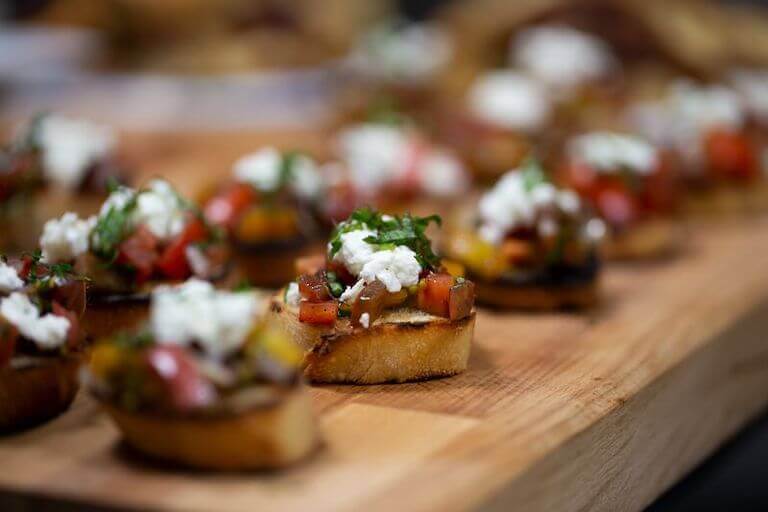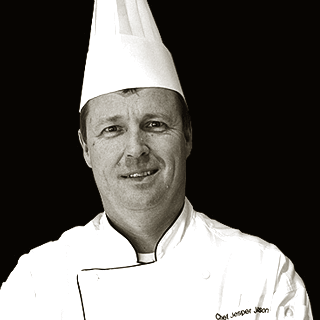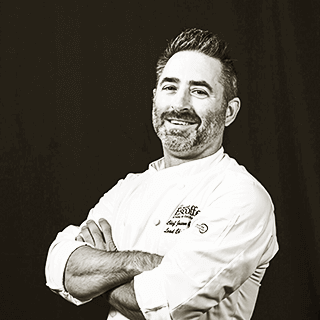Listen to This Article:
When it comes to spending time in the kitchen, some people prefer cooking meals from tried-and-true recipes while others prefer tinkering with ingredients and techniques to make something new. Likewise, some culinary professionals prefer following instructions while others want to bring their own ideas to fruition.
If you fall in with the latter group, spend your days exploring ideas for food startups, and can’t stop researching how to start a food business, a career in food entrepreneurship could be for you.
Join us as we dive into eight career paths for food entrepreneurs.
1. Open Your Own Restaurant
Opening a restaurant is a dream of many cooks and chefs. Being able to call the shots on decor, menu creation, hiring, and more can be extremely rewarding. However, it can also come with its fair share of challenges and a need for wide-ranging expertise.
Becoming a Restaurant Owner
1. Create a Business Plan
Who are you serving and where? What kind of food will you make? What gap are you filling in your local market? How profitable do you think you can be? You’ll need to answer all of these questions before you can start building out your concept.
Don’t know where to start? Associate degree students at Auguste Escoffier School of Culinary Arts can begin to write a business plan as part of their Culinary Entrepreneurship course.
2. Secure Funding
Opening a restaurant isn’t cheap, and most entrepreneurs can’t start a restaurant without some outside funding. You can apply for grants like Escoffier graduate Tiffany Moore did, or find business loans from a bank or credit union.*
“A student that graduates from Escoffier can be able to participate in much better culinary conversations and understand a lot more about not just cooking, but how a business is run.”*
Jesper Jonsson, Chef Instructor
3. Find and Outfit Your Space
Once you’ve signed that lease, it all gets real! You’ll need restaurant furniture, kitchen equipment, dishes and glassware, cooking utensils—the works! Make a checklist so you don’t forget anything.
You may also need to hire your managers, kitchen team, and service staff in advance, so they can be well-trained on the menu and service style.
4. Hold a Grand Opening
When the menu is ready, and the restaurant looks like a restaurant, it’s time to welcome the public. Promote your grand opening on social media and in the local press to make sure it’s a hit.
2. Start a Food Truck
Starting a food truck can be an amazing way to begin a career in food entrepreneurship. You can create your own menu, cook, interact with guests, and market your business—actions you would also complete while running a brick-and-mortar restaurant. But the small food truck footprint usually means you’ll invest a bit less money before you can open your service window.
To own a successful food truck, you may likely need to know your way around the kitchen. You may find that even if you already have some kitchen experience, there are gaps in your knowledge that you may want to fill by attending culinary school.

Owning a food truck requires culinary and customer service skills.
Auguste Escoffier School of Culinary Arts graduate and food truck owner Nahika Hillery said she didn’t feel comfortable with the title of “chef” without also complementing her industry experience with a culinary education. She enrolled in Escoffier with the hopes of improving her culinary and business skills, and she reports her investment in her education made a noticeable impact.*
“After my experience at Escoffier, I noticed a huge change in my business,” Hillery said. “I’m making more things from scratch instead of just buying them pre-bottled, using even the remains of vegetables and meats to blend and make marinades and stock. I also really love the routine factor of culinary school. I use that same model now on the food truck and our days run better and orders are going out a lot faster.”*
Becoming a Food Truck Owner
1. Research Your Market and Choose Your Niche
Just like with restaurants, food trucks can go in hundreds of different directions. Along with thinking about what culinary skills you possess, consider local competition as well as consumer demand. If you dream of opening a burger truck in your neighborhood, but there are already three burger trucks within a mile, you may want to consider a different concept or a different neighborhood!
2. Build Your Truck
Whether you start from scratch with a brand-new truck or refurbish an old school bus, there will be costs and customization involved. Give yourself plenty of time for this because construction— even truck-sized construction—always takes longer than you imagine.
You may also need to get local and state permits to make sure you’re allowed to operate.
3. Open Up Shop—You’re a Food Truck Owner!
One great thing about food trucks is that you can open up with a small menu, a staff of one or two, and your own unique menu pretty quickly! However, it’s important to have an understanding of cost control, inventory management, and other business skills if you hope to succeed. If you feel like you could learn a thing or two about the business side of running a food truck, you may find Escoffier’s Food Entrepreneurship program helpful.
3. Go Virtual: Consider a Ghost Restaurant
A ghost restaurant is a virtual restaurant dedicated to delivery and/or takeout food. The menus are only available online, and businesses sell through a website or through a third-party delivery app like Uber Eats or GrubHub.
Many entrepreneurs prefer ghost restaurants over brick-and-mortar establishments due to their low startup costs and increased flexibility.
Becoming a Ghost Restaurant Owner
1. Find a Commercial Kitchen Space
Ghost restaurant owners can rent space in a larger commercial kitchen that allows them to operate safely and effectively. Commercial kitchen spaces vary, so look for any desirable features like WiFi access or food runners who bring finished orders outside to the drivers.
2. Build Your Menu
Do some research on what else is available in your area and try to fill an unmet need. And since you won’t be plating dishes for customers to enjoy in-house, you should also think about creating a delivery-friendly menu.
3. Partner with Delivery Drivers
Whether you hire your own drivers or partner with a third-party delivery service, you’ll need someone to bring the food to your customers.
4. Market Your Business and Start Cooking!
Since ghost restaurants don’t have a brick-and-mortar presence, you’ll need to find creative ways to market. Ensure that you create a Google Business profile, become active on social media, and consider partnering with a food influencer to let others know about your restaurant.
4. Become a Caterer
If you dream of cooking pork chops and lasagna for hundreds of wedding guests or dishing out trays of cookies for private parties, starting a career as a catering company owner may be a good path to take.
Becoming a Catering Company Owner
1. Determine Your Specialty
Before you get started as a caterer, you’ll need to determine what type of food you’ll offer, the type of events you will cater, and the volume you can handle. Caterers can cook everything from hundreds of hors d’oeuvres for wedding receptions and fundraising galas to single servings of healthy dinners for busy families.

Caterers can create anything from bruschetta appetizers to five-course meals.
2. Find a Cooking Space
Most caterers prepare their food in one area and then transport it to the venue where it will be served. Depending on your needs and local regulations, you may be able to prepare food in your home kitchen. Or you may find it’s necessary to rent a commercial kitchen space.
3. Spread the Word
Once you’ve developed a menu, obtained kitchen space, and hired any necessary staff, it’s time to find your first clients. Establish an online presence with a website, social media profiles, and listing on websites such as theknot.com, and consider networking with local party planners and event venues.
5. Flex Your Creative Muscles as a Food Stylist
Food stylists work to arrange food so it jumps off the pages of magazines, product labels, and restaurant menus. While these professionals don’t always cook the food they work with, they still need to have a thorough understanding of ingredients and cooking techniques.
“In most cases, you’re responsible for everything: shopping for the ingredients, cooking the ingredients, [plating the dish]. You have to know how long the food is going to be on set. How many multiples do you have to make? Is anyone going to eat it?”*
Lisa Spychala, Online Culinary Arts Graduate and Food Stylist
Becoming a Food Stylist
1. Gain an Understanding of the Culinary World
Food stylists need to know how to cook chicken so the skin is golden brown, arrange layer cakes so the frosting sports crisp lines, and place garnishes so they add to rather than take away from a dish. They also need to know how to use terminology to properly communicate with chefs, food photographers, and other professionals.
2. Practice Your Skills and Build a Portfolio
Most food stylists are not full-time employees but rather contract workers. Putting together a portfolio that captures your best work can allow companies to see what you have to offer and encourages them to work with you.
3. Secure Your First Projects
With a portfolio in hand, it’s time to land your first styling gigs! Try applying to calls for food stylists and also using your network (such as culinary school peers and Chef Instructors) to let others know you’re available to help them capture their food.
6. Share Your Knowledge with Others
A chef consultant is an independent expert that can help with training, kitchen efficiency, designing menus, product development for retailers, and more. Some consultants are specialists in more technical areas like Hazard Analysis Critical Control Point (HACCP) programs, fermentation, or cost control. If you’re good at finding solutions to complex problems, this could be a great career for you.
Becoming a Chef Consultant
1. Gain a Broad Understanding of the Culinary World
No matter what type of consultant you wish to become, it helps to understand all components of the culinary world. After all, ingredient purchasing, staff retention, and restaurant design are all interconnected! Culinary school can be a great way to gain exposure to a wide variety of topics related to the culinary arts.
2. Find Your Specialty
As you spend time in culinary school or the workforce, you’ll likely see certain strengths emerge. Perhaps you’re a wiz with numbers and find it easy to see where restaurants can cut costs. Or maybe you notice how integrating the latest technology can help chefs streamline their operations. Once you recognize what type of consultant you’d like to become, do your best to become an expert in this area.
3. Begin Working with Chefs
When it comes to working with chefs, it helps to have an idea of the challenges they face. Working in a kitchen or completing a culinary externship can help you empathize with chefs and offer them practical solutions. You can start by reaching out to chefs you know or, if you’re an Escoffier graduate, tapping into networks like the Escoffier Alumni Association.
7. Mix Art and Science as a Recipe Developer
A recipe developer gets the fun job of turning raw ingredients into something new. Whether that’s a unique concept or just a fresh take on a classic dish, developers employ creativity and innovation to deliver delicious and easy-to-follow recipes.
Becoming a Recipe Developer
1. Learn How Ingredients Work Together
Recipe developers, more than nearly anyone else in the culinary industry, have to understand why certain ingredients work (or don’t work) together. How do baking soda and baking powder impact cake differently? Does oil or butter create a darker crust on baked chicken? Culinary school can help individuals better understand how specific ingredients interact.
2. Play Around with Recipes
Before you can begin offering recipe development services to restaurants and food companies, you may need to become confident in your skills. That means spending time in the kitchen playing around with ingredients until you get things just right.
3. Create a Portfolio and Pitch Your Services
Once you’ve honed your skills, it’s time to begin offering your services to others. While there are some full-time recipe development positions available, many of these professionals work in contract roles. Having a strong portfolio and a professional education may help you stand out from the crowd.
“When you start a business, you want to remain true to the concept. Chefs can get bored by doing the same thing over and over. That’s how they start to grow and expand. But be very mindful. It’s healthy to want to expand and do new things, but make sure you’re not stretching yourself too thin. It’s already stressful being a business owner. And when you add more and more, you can really thin with time.”*
Jason Goldman, Chef Instructor
8. Become a Food Influencer
If you’d like to shape the way the food industry moves forward, consider becoming a food influencer. These professionals work to connect with others and convince them to try out a new product, ingredient, or recipe.
Becoming a Food Influencer
1. Begin Creating Content
Before you can become hired by a food brand or restaurant, you’ll need to showcase your content creation abilities! Depending on your strengths, you may capture beautiful photos and craft engaging captions for Instagram, film videos for YouTube, or start a food-related podcast. Your content should prove helpful to viewers, listeners, or readers, and encourage them to follow you.
2. Start Interacting with Potential Clients
One of the great things about social media is how easy it is to interact with both big brands and individuals. If you’re working with a certain ingredient, make sure to tag the brand. And if you go out to eat at a restaurant, give the place a shoutout on your channel or feed.
3. Reach Out to Brands for Collaboration
After you’ve shown your skills and built a sizable following, it’s time to monetize your work! This may involve working with cookware brands via affiliate programs or getting paid to showcase a specific product.
Are You Seeing a Pattern Here?
While every roadmap to becoming a food entrepreneur requires some specialized knowledge, they may require a comprehensive understanding of the culinary arts. Some entrepreneurs get this education over many years of working in restaurants or other food service businesses, but some find that a culinary education can be a faster and more thorough way to learn about both food and business.
If you want to start working your way through one of these roadmaps, culinary school at Escoffier can be the place to start. You can explore our traditional culinary arts programs, online pastry school, or enroll in our Food Entrepreneurship program to grow your understanding of food and business.
Looking for more information about becoming a food entrepreneur? Explore these resources:
- 7 Side Hustles Great Cooks Can Start For Extra Cash
- How Many Employees Does It Take to Run a Restaurant?
- How GLEAM & Escoffier’s Mentorship Program Can Guide Aspiring Entrepreneurs
This article was originally published on May 24, 2021, and has since been updated.
*Information may not reflect every student’s experience. Results and outcomes may be based on several factors, such as geographical region or previous experience.

 “A student that graduates from Escoffier can be able to participate in much better culinary conversations and understand a lot more about not just cooking, but how a business is run.”*
“A student that graduates from Escoffier can be able to participate in much better culinary conversations and understand a lot more about not just cooking, but how a business is run.”* “In most cases, you’re responsible for everything: shopping for the ingredients, cooking the ingredients, [plating the dish]. You have to know how long the food is going to be on set. How many multiples do you have to make? Is anyone going to eat it?”*
“In most cases, you’re responsible for everything: shopping for the ingredients, cooking the ingredients, [plating the dish]. You have to know how long the food is going to be on set. How many multiples do you have to make? Is anyone going to eat it?”* “When you start a business, you want to remain true to the concept. Chefs can get bored by doing the same thing over and over. That’s how they start to grow and expand. But be very mindful. It’s healthy to want to expand and do new things, but make sure you’re not stretching yourself too thin. It’s already stressful being a business owner. And when you add more and more, you can really thin with time.”*
“When you start a business, you want to remain true to the concept. Chefs can get bored by doing the same thing over and over. That’s how they start to grow and expand. But be very mindful. It’s healthy to want to expand and do new things, but make sure you’re not stretching yourself too thin. It’s already stressful being a business owner. And when you add more and more, you can really thin with time.”*